TOPICS OF THE DAY.
WANTED A DELIVERER.
ALTHOUGH public affairs at this juncture may seem vehemently to desiderate -practical men, we are not sure that it is not theoretical
men that they more especially demand. By theoretical men, ob-
serve, we do not mean theorizing men, centralization men," coarser- food" men, check-the-population men, cottage-and-cow men, nor
any other class of schemers and dreamers and disciplinarians of the new-crotchet and candle-end schools ; but men of good intellectual dimensions, who can look over the heads of one generation and see the next coming—farsighted and reasoning men, who can fore- tell a storm without augury, and assuage it without miracle. One would think such men had departed from the face of the earth altogether, carrying away with them, for ever, the goodly gifts of human foresight and sagacity. The masters of political science are no more, and we are left at the mercy of the Journeymen— .
the fobbing journeymen, W110 charge by the day and never have done with their work—who .botch every thing they put their hands to, anti rob the house-into the bargain. Oh ! for a PITT or a DuNwts, and a scientific despotism, and the privilege of an intelli- gible hatred and an effectual resistance ! Oh ! for a tyrannous master, rattler than it botching, thievish journeyman !
But let us improve upon our expression " theoretical men"— let us rather say reasoning, or philosophical men.- There never
was it more foolish antagonism got up between any two words than
.between philosophy and practice. All practice, that is good for any thing, must grow out of philosophy ; all philosophy, that is
good for any thing, must result in practice; the two things, instead of being antagonist, arc in fact most hitimately and inseparably re- lated. The true difference lies, however, between their visible re- • presentatives—between the philosopher and the practitioner ; and this, not rightfully or needfully, but for a perverse reason : we
mean, that while the philosopher is discerning the necessity of new practices and proceeding to institute them, the practitioner—hhn- self the unconscious offspring of some foregone philosopher—is op- posing him tooth and nail, and denouncing all philosophy, although in reality by that very contention most cogently vindicatiug it, and attesting its influence over himself. To express the matter in the shortest form, let us say—present practice is the result of past philosophy, but present philosophy is the cause of fu- ture practice. But this only describes philosophy in it:; closet aspect and as a thing of letters. There is, or was, such a thing as practical philosophy ; which, it' it means any thing, must mean a philosophy that carries its own results along with it. And this— to apply the argument to polities—is the stuff of which legislators used to be made, in times now called barbarous, and which has gone to the composition of all statesmen that ever lived—worthy of the name. It' philosophy is too pedantic a word, or should be thought to ring in the ear with any thing of an Edinburgh twang, call it wisdom, which gives this rank to the political ruler. It is the gift. of original thought superinduced on the vigorous qualities of gene- ralship ; it is the power of seizing at once the true spirit anti import of any new conjunction of circumstances. and acting up to the oecasion. It is even the ability to pass mentally into the heart of' the future, and anticipate those social revolutions which are continually taking place whether we choose to mark them or not, that so, by timely inclination, changes which are iaevitable may be made harmless, and transition easy.
lint what should the political journeymen know of all this? Jobbers by the day, what is it to them what the morrow may bring forth ? llow can it hurt them, though their politics and "knavish tricks" sow hatred anti disunion between all classes of the com- munity, and leave to posterity a tangled thread of troubles, if when the outburst comes, they are gone ? It' they have laid their nmnument in bloodshed and civil war. what is it to them? It will be said—they lived, and. while on earth, their bread was buttered What more can you, or they require ? They achieved the ends of their being—" Requiescant in pace."
Perhaps it hardly required the exercise of so high an intelligence as we have described, to arrive at a correct view of the nature of tie present troubles. T110 downright reality of political grievances, the pre,:ence of danger and disaffection, the reasonableness and imperativeness of the call that has been made for legislative changes.—these are facts that must. be plain to the sight of every man of the least possible ultra-nasal power of vision. Nobody, able to nec the next house without a telescope, can titil to see that the present agitation is a natural and actual motion of the whole body politic, and no feint or make-believe ; that it is the real wolf come at last, and " at the door." But though much philosophy is not required to take in the mere pre•ence of these things, sonic is wanted, (more than the iii,. hot \vorld of politics is likely to fitrnish,) as well for their due logical connexion with antecedent events, as ihr their more delivate reference to the plarnomena of social progression, and lastly—since, as we have said, philosophy must be crowned by practice—for the institution of such a course of politics as that survey would point out for adoption. If all the notions about. politics which make up what is called " public opinion" were fused together ia a furnace, we conceive the general mass would just exhibit the two varieties, Tory and Radical, and no more. (Whigs have no politics; or, it' they have, they are so tine that we never could collect them; and we assume that any thing so immaterial would altogether evapo- rate in a red heat.) To the Tory or the Radical doctrine, till poli.
tical opinion might probably, even now, be referred; and there can
be no doubt that it is between them the battle must ultimately rest. Let it come, and the sooner the better ; for, before it can come at all, these holyday soldiers with their sham guns must be removed from the field to make way for proper men and real powder.
Now, as we must refuse to believe that such a statesman as we
have described could be found ranged on the Obstructive side of politics, we of course identify him with the principles of Radical Reform: by which we always understand, the unflinching and con- tinual correction of political abuses, the accommodation of public burdens to the "quid valcant humeri"—in other words, the capa- city of the public shoulders; and in regard to innovation, just such a willingness to adopt and just such a disposition to reject new practices, as would consort, perhaps, with the expressions of Lord BACON on that head; who, after enumerating the principal com- monplaces of Conservatism, adds, with well-weighed wisdom, " All which is true ff time stood still—which, contrariwise, moveth so round, that a froward retention of custom is as turbulent a thing, as an innovation ;" and much more in the same vein of refle•2tion, equally admirable.*
If thus at any time animated and instructed, assuredly sloth a
statesman as we have imagined would, at this crisis, survey the field of politics with more than usual interest and attention. It is probable he would find reason to believe, that the oceurrenees which are taking place around us are—after every reasonable de- duction that can be made on the score of present accidents or occasional influences—links in a solid chain of human events, which has been continually evolving itself ever since the Reformation and „ the invention of printing, and which has for its final development the amelioration and elevation of the whole species. In the mean- time, be would recognize the necessity of meeting certain exigeneles of the time by the concessions which are demanded ibr them ; and this, not as a compulsory act, to be perfbrmed and then deplored, but as an obvious part of political progression, as a nefe7- ful point in the ever-moving life of the social b,sly—a matter abut which regrets would be as childish and imteeper as any that should be expressed upon the on-coming of those rotund and un- avoidable epochs of the individual life which are marked by our various changes of dress, diet, or habits. Such reflections wou1.1 probably enter into the mind of any statesman whom the political influences of the moment or the mean calls of personal interest did not wholly divert from wider views and larger sympathies. Such reflections mast enter into the mind of any statesman who would now either save his country from civil isetrfare or himself from execration.
* "Of Innovations."



























 Previous page
Previous page